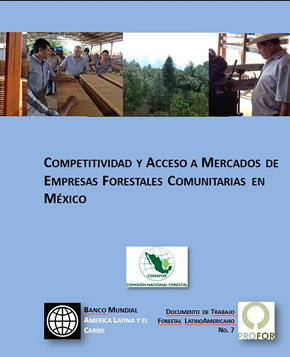The multi-donor Program on Forests (PROFOR) partnership has published a study on the competitiveness and access to markets of 30 representative community forest enterprises (CFEs) in 12 states of Mexico, which includes a set of recommendations to the Government of Mexico on enhancing the competitiveness of community forestry.
 9 July 2013: The multi-donor Program on Forests (PROFOR) partnership has published a study on the competitiveness and access to markets of 30 representative community forest enterprises (CFEs) in 12 states of Mexico, which includes a set of recommendations to the Government of Mexico on enhancing the competitiveness of community forestry.
9 July 2013: The multi-donor Program on Forests (PROFOR) partnership has published a study on the competitiveness and access to markets of 30 representative community forest enterprises (CFEs) in 12 states of Mexico, which includes a set of recommendations to the Government of Mexico on enhancing the competitiveness of community forestry.
The PROFOR study, conducted by the World Bank and Mexico’s National Forestry Commission (CONAFOR) and based on first-hand information provided by the CFEs themselves, looked at such issues as: land equivalent values; CFE profitability; forest management; harvesting activities; sawmills; income from non-timber forest products (NTFPs); and payments for environmental services (PES). The study notes that while the data from the 30 CFEs, while showing great variability, were sufficiently robust to estimate the cost and profits of CFEs in each stage and assess their financial viability, sustainability and competitiveness.
The analysis shows that Mexican CFEs have relatively high production costs at every stage of the chain, perhaps due to extensive and mountainous terrain and/or the low mechanization in processes, but that generally prices cover costs along the chain, and in-country demand in Mexico appears sufficient to ensure CFE profitability in the short term. The study cautions, however, that unless steps are taken, CFEs may find it difficult to compete in the Mexican market with timber products from countries with lower production costs. The study concludes that CFEs are an “interesting opportunity for investment and sustainable rural development.”
The study’s recommendations include: a market for secondary wood products should be found so there is less wastage; the administration of EPCs should be improved, particularly in managing information and accounting; CFEs should invest more of their gains in improving the enterprise; CFEs should seek specialized niches in international markets to exploit; CFEs need to plan their harvests better with a view to long-term sustainability; and CFEs should look into gaining income from NTFPs and alternate sources of income, such as carbon credits. The study also suggests a follow-up exercise; a series of workshops to explain its findings and instruct CFEs in financial analysis and how to identify ways to reduce costs while enhancing competitiveness and sustainability.
PROFOR was created in 1997 to support in-depth analysis, innovative processes and knowledge-sharing and dialogue on forest conservation and management in developing countries. [Publication: Community Forestry Enterprise Competitiveness and Access to Markets in Mexico (in Spanish)]